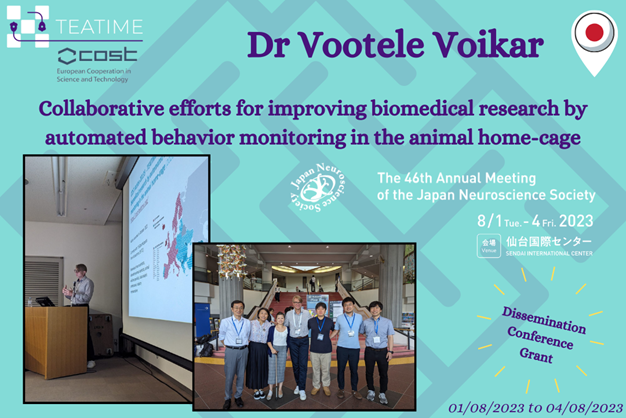
Conference Details
Conference title: The 46th Annual Meeting of the Japan Neuroscience Society (JNS2023)
Conference web page: https://neuroscience2023.jnss.org/en/index.html
Conference venue: Sendai International Center, Sendai, Japan
Conference start and end date: 01/08/2023 to 04/08/2023
Oral contribution details
Title of the oral presentation: Collaborative efforts for improving biomedical research by automated behavior monitoring in the animal home-cage – COST Action TEATIME
Session: [4S09m] Fundamentals, Applications, and Future of Automated Home-Cage Behavioral Monitoring/Phenotyping in Neuroscience
Conference participation outcome
I was invited to the JNS2023 meeting by Dr. Toshihiro Endo, who is founder of the SME Phenovance LLC (https://www.phenovance.com/) doing contract research and developing Home-Cage Monitoring systems in Japan. Dr. Endo is a very enthusiastic young researcher and a strong advocate of novel methodology. I visited the premises of the company in Tokyo and had discussion about their work. In addition to rodents, they are developing RFID-based monitoring systems for fish, reptiles, and marmosets. They are very interested in broadening the contacts beyond Japan on collaborative basis. The JNS2023 meeting in Sendai gathered more than 2500 attendees, mostly from Japan, but also other Asian countries were represented, along with few participants from Europe and US. During the meeting, I was committed to spreading the information about TEATIME Action, particularly promoting our Discussion Forum and Catalogue. For that to be effective, I mostly spent time in poster sessions and exhibition area, looking for the posters where conventional behavioural testing was represented and interacted with the presenters. During the meeting, 50 leaflets on Action, and 50 leaflets on Forum, were distributed. Even though 9 out of 278 responders to our survey were from Japan, in general this information was new to everyone I spoke. The session on the HCM topic on last day of the meeting was very successful, with more than 60 delegates in the lecture room (full room), and I heard that not everyone interested could not have a seat. The five speakers (representing institutions from Japan, UK, USA, Finland) presented different aspects of usefulness offered by HCM (novel technology – contactless metabolism; RFID-based monitoring; case-study for using HCM for behavioural phenotyping; possibility to enhance finding of QTLs by using HCM with Collaborative Cross and/or Diversity Outbred mouse lines; European network – see the abstracts enclosed as separate file). The main aim of the session, according to the organisers, was to promote potential of the HCM (also considering the animal welfare and reproducibility) among Japanese neuroscience community, and I totally agree with their conclusion after the session that it was successful and fully met the expectations. I hope the contacts made with the speakers and organisers will open some new networks and maybe even collaborations, whereas in general I am looking forward to having more subscribers to our Forum and Newsletter from Asia.